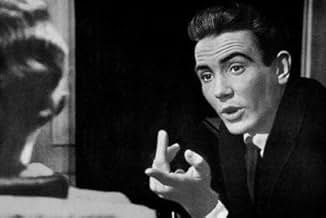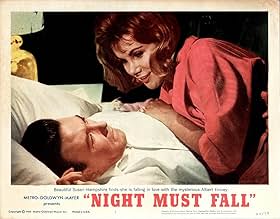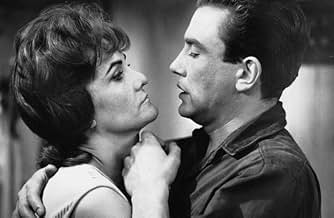IMDb-BEWERTUNG
6,5/10
1081
IHRE BEWERTUNG
Füge eine Handlung in deiner Sprache hinzuA psychotic killer gets in the good graces of his aging invalid employer, and worms his way into the affection of her beautiful daughter, with unpleasant results for all.A psychotic killer gets in the good graces of his aging invalid employer, and worms his way into the affection of her beautiful daughter, with unpleasant results for all.A psychotic killer gets in the good graces of his aging invalid employer, and worms his way into the affection of her beautiful daughter, with unpleasant results for all.
- Regie
- Drehbuch
- Hauptbesetzung
- Auszeichnungen
- 1 Nominierung insgesamt
Joe Beckett
- Detective
- (Nicht genannt)
George Curtis
- Member of Search Party
- (Nicht genannt)
Fred Davis
- Police Officer
- (Nicht genannt)
Richard Neller
- Guest
- (Nicht genannt)
Emile Stemmler
- Waiter
- (Nicht genannt)
Empfohlene Bewertungen
You can tell that Danny (Albery Finney) ain't quite right by the erratic way he rides his scooter. And the fact that we see him chopping up and disposing of a body in the opening scene.
Having charmed his way into the knickers of maid Dora Parkoe (Sheila Hancock), knocking her up, Danny worms his way into the household of Dora's employer, elderly Mrs. Bramson (Mona Washbourne). At first, the old lady's daughter Olivia (Susan Hampshire) dislikes Danny, but the young man's rizz eventually wins her over. But what does Danny keep in the hat box in his room?
Predating real-life serial killer Ted Bundy's activities by a decade, Night Must Fall is a fascinating study of a psychopath who, on the surface, is a charismatic individual, but who is, in reality, a deeply disturbed whack job. While Danny works his magic on Mrs. Bramsom and Olivia, the police are dragging the nearby lake for a missing woman, eventually finding her body, minus the head. And although we never see the missing noggin, it's made pretty obvious where it is (with scenes reminiscent of the infamous box incident recounted by Jeffery Dahmer's father).
Despite adopting a rather annoying 'boyo' Welsh accent for the role, Finney is excellent as the manipulative psychopath, lending his character a much-needed sense of realness (as one might expect from an actor who found fame in the kitchen-sink drama genre). We get glimpses into Danny's past, giving us an insight into what has made him so flaky, both his mother and father dying when he was very young; this also goes some way to explaining the rather perverse mother/son relationship he develops with Mrs. Bransom, which leads to the film's shocking climax.
Well acted, grim, and surprisingly brutal at times, Night Must Fall is a compelling study of a dangerous individual, and, although I didn't quite buy into the ending, in which Danny realises that the game is up and is reduced to a gibbering wreck, I still recommend the film to fans of gritty psycho-thrillers.
Having charmed his way into the knickers of maid Dora Parkoe (Sheila Hancock), knocking her up, Danny worms his way into the household of Dora's employer, elderly Mrs. Bramson (Mona Washbourne). At first, the old lady's daughter Olivia (Susan Hampshire) dislikes Danny, but the young man's rizz eventually wins her over. But what does Danny keep in the hat box in his room?
Predating real-life serial killer Ted Bundy's activities by a decade, Night Must Fall is a fascinating study of a psychopath who, on the surface, is a charismatic individual, but who is, in reality, a deeply disturbed whack job. While Danny works his magic on Mrs. Bramsom and Olivia, the police are dragging the nearby lake for a missing woman, eventually finding her body, minus the head. And although we never see the missing noggin, it's made pretty obvious where it is (with scenes reminiscent of the infamous box incident recounted by Jeffery Dahmer's father).
Despite adopting a rather annoying 'boyo' Welsh accent for the role, Finney is excellent as the manipulative psychopath, lending his character a much-needed sense of realness (as one might expect from an actor who found fame in the kitchen-sink drama genre). We get glimpses into Danny's past, giving us an insight into what has made him so flaky, both his mother and father dying when he was very young; this also goes some way to explaining the rather perverse mother/son relationship he develops with Mrs. Bransom, which leads to the film's shocking climax.
Well acted, grim, and surprisingly brutal at times, Night Must Fall is a compelling study of a dangerous individual, and, although I didn't quite buy into the ending, in which Danny realises that the game is up and is reduced to a gibbering wreck, I still recommend the film to fans of gritty psycho-thrillers.
This project was done in a hurry when a proposal to make a film of Ned Kelly was axed by MGM due to budget worries (at this time Tom Jones had been filmed but not released).
It is not clear why Riesz decided to make a film of this play. Clearly, the part of Danny is tailor made for some show-off acting and Finney grabs the bull by the horns here. His only real mistake is to put on a silly 'boyo Welsh accent. True, the character was Welsh in the play but that's because the part was written by the playwright to play himself. Otherwise, there is no dramatic need for Danny to have a Welsh accent and Robert Montgomery didn't bother in the 1937 version.
The main difference between the film and the play is that the film reveals its hand in the first minute that Danny is a psycho killer. In the play, its not clear until near the end and much of the dialogue are cat n'mouse exchanges between Danny and Olivia.
The result of this is to create a somewhat boring film; you know who the killer is and thus spend an hour and a hour waiting for him to explode. When he does, it has little logic and, to an audience used to the likes of Psycho and its rip-offs like Homicidal, seeing Finney deliver one blow to an off-screen body that you never get to see was always going to be a serious let-down. His retreat into gibberish at the end I thought was uncharacteristic and a cop-out. You never find out who the real Danny is and why he has acted like he has done. I did enjoy the 'hangbags' between Sheila Hancock and Susan Hampshire on the high street of an authentically 60s wet Hertfordshire town.
It is not clear why Riesz decided to make a film of this play. Clearly, the part of Danny is tailor made for some show-off acting and Finney grabs the bull by the horns here. His only real mistake is to put on a silly 'boyo Welsh accent. True, the character was Welsh in the play but that's because the part was written by the playwright to play himself. Otherwise, there is no dramatic need for Danny to have a Welsh accent and Robert Montgomery didn't bother in the 1937 version.
The main difference between the film and the play is that the film reveals its hand in the first minute that Danny is a psycho killer. In the play, its not clear until near the end and much of the dialogue are cat n'mouse exchanges between Danny and Olivia.
The result of this is to create a somewhat boring film; you know who the killer is and thus spend an hour and a hour waiting for him to explode. When he does, it has little logic and, to an audience used to the likes of Psycho and its rip-offs like Homicidal, seeing Finney deliver one blow to an off-screen body that you never get to see was always going to be a serious let-down. His retreat into gibberish at the end I thought was uncharacteristic and a cop-out. You never find out who the real Danny is and why he has acted like he has done. I did enjoy the 'hangbags' between Sheila Hancock and Susan Hampshire on the high street of an authentically 60s wet Hertfordshire town.
To start with a little off-topic note: in 2003, Tim Burton made the film "Big Fish" which stars Ewan McGregor as a younger version of Albert Finney. When you actually see "Night Must Fall", which was shot around the time when Finney was in his late 30's, it becomes obvious how good this casting choice was! From multiple camera angles, McGregor really looks a lot like the young Finney and the facial expressions are almost exact. "Night Must Fall" itself is a truly interesting and involving thriller and I wonder why on earth it's so underrated! This is a remake of a 1930's thriller that stars Finney as a dangerous, yet very charismatic psychopath who systematically works his way up in a high-society family as a pageboy. After a while, the elderly lady and her daughter grow really fond of him but his mind and intentions are still disturbed. The film has a terrific opening sequence (the frightening image of Danny getting rid of his murder victim) and an extremely suspenseful finale! Everything in between is a bit too talky and at times somewhat dull, but you keep watching since Finney's performance is so outstanding. Especially the scenes in which he relives his vile crimes up in his room (forcefully holding the hat-box that contains grim trophies) are very tense and unsettling. Reisz' directing is well-handled but it merely is Freddie Francis' imaginative photography that makes this film so dreamy and beautiful. Francis unquestionably was Britain's best cinematographer of that time and he also directed a couple of entertaining horror films ("Trog", "The Creeping Flesh", "Tales that Witness Madness
")
A critical failure at the time of its release and considered something of a let-down for its director and star, (it was certainly an odd choice of material), this 1964 film version of Emlyn Williams' play, (it was written in 1935 and filmed two years later with Robert Montgomery), is nowhere near as bad as people say. It's the one about the young psychopath, (a terrific Albert Finney), who worms his way into the affections of elderly invalid Mona Washbourne, (superb), and her initially stand-offish daughter, (an excellent Susan Hampshire). The problem is that in attempting to get to the psychological heart of the piece director Karl Reisz drains it of all suspense and Clive Exton's screenplay, (I haven't seen or read the original play), is a bit on the dull side. But neither is it a disaster and I have never understood why it disappeared so soon after its initial appearance.
To each his own taste, but I have to disagree with the other review of this movie. I love Albert Finney's performance as a psychopath who has the gift of perceiving the innermost needs of those he meets and then molding his own personality to take advantage of those needs. (I don't know anyone from Wales, nor do I know what a stereotypical "mad Welshman" is.) He and Mona Washbourne play off each other superbly. I do agree with the other review's assessment of the cinematography, and especially love the lighting. To see Finney in TOM JONES (previous) or TWO FOR THE ROAD (following), although he is young, his face does have character and expression lines - he is human. The lighting in this movie smooths his face to make it seem devoid of affect; you feel that his reactions to the people and the world around him spring not from human emotion but from insanity. If you're an Albert Finney fan I definitely recommend viewing this movie and making your own judgment.
Wusstest du schon
- WissenswertesKarel Reisz and Albert Finney had spent a year, including 10 weeks scouting Australian locations, developing a "Ned Kelly" project, but after Columbia finally pulled the plug, they quickly set up "Night Must Fall" at MGM.
- PatzerWhen Olivia is driving home from town, and it's pouring down, there is very heavy 'rain' falling in front of the car as she goes down the hill. In the near background, all of the treetops are still.
- VerbindungenFeatured in MGM Is on the Move! (1964)
Top-Auswahl
Melde dich zum Bewerten an und greife auf die Watchlist für personalisierte Empfehlungen zu.
- How long is Night Must Fall?Powered by Alexa
Details
- Erscheinungsdatum
- Herkunftsland
- Sprachen
- Auch bekannt als
- Al caer la noche
- Drehorte
- Produktionsfirmen
- Weitere beteiligte Unternehmen bei IMDbPro anzeigen
- Laufzeit
- 1 Std. 32 Min.(92 min)
- Farbe
- Seitenverhältnis
- 1.66 : 1
Zu dieser Seite beitragen
Bearbeitung vorschlagen oder fehlenden Inhalt hinzufügen


























